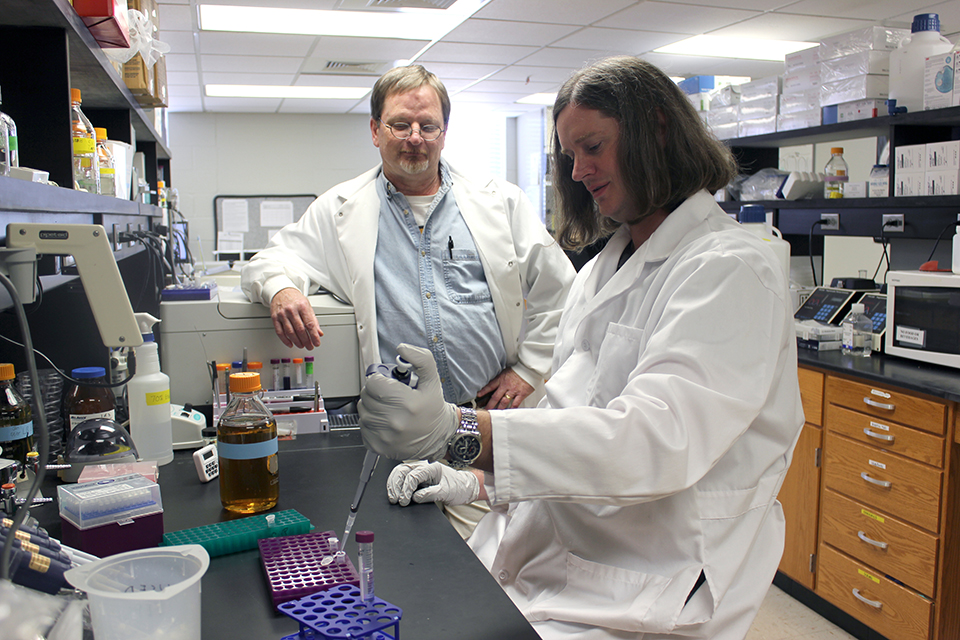Doctoral Student Invited to Prestigious Aging Workshop
College of Veterinary Medicine Biomedical Sciences doctoral student Brett Augsburger has been invited to attend a National Science Foundation workshop on aging, the only graduate student to be invited to this prestigious gathering.
The workshop, May 7-8 in Fairfax, Va., will bring together about 25 diverse, internationally-recognized scientists representing physics, materials science, information science and biology to brainstorm about the principles and processes underlying aging.

Augsburger, originally from Huntsville, was personally invited to attend the conference by Dr. Leonard Hayflick, considered internationally as an
authority on the science of organismal aging. Hayflick studied the processes governing cellular replication and, in 1961 at the Wistar Institute, identified a phenomenon that came to be known as the Hayflick Limit, based on the observation that normal human cells can only divide 40 to 60 times before losing the capacity to divide any further. Researchers later found that the Hayflick Limit is related to the shortening of telomeres, or portions of DNA at the ends of chromosomes that slowly degrade as cells replicate.
Augsburger is working in the research laboratory of Dr. Michael Irwin, a professor in the College of Veterinary Medicine’s Department of Pathobiology, whose research uses animal models to study mitochondrial dysfunction.
“It’s very unusual for a graduate student in this field to write a theory paper, but Brett is not your typical graduate student,” Irwin said.
Augsburger’s research is concerned with our susceptibility to disease as we age, specifically the dynamics that cause humans to be more susceptible to diseases the longer they live. “The approach I’m looking at is how we prevent the increased susceptibility from occurring in the first place,” he said. “I’m not looking at any specific disease, but rather the root causes of aging.”
Earlier this year, Augsburger sent his manuscript, “Rate of Aging is Determined by an Organism’s Overall Entropy Management Strategy”, to Hayflick in hopes of getting some constructive feedback.
Hayflick was sufficiently impressed by the manuscript that he asked organizers to extend an invitation for Augsburger to attend the NSF workshop.
“This opportunity is unique, exciting and has the potential to be professionally transformative for Brett,” said Frank Bartol, associate dean for Research at the College of Veterinary Medicine. “The Biomedical Sciences graduate program is fortunate to have doctoral students like Brett Augsburger, whose contributions to science are already garnering national attention.”
Augsburger said he decided to send Hayflick the manuscript “to see if he would be interested in my theory. I didn’t expect him to respond as quickly as he did, and in the manner in which he did.”
Augsburger, whose undergraduate degree from Auburn is in mechanical engineering, became interested in aging theory after recognizing the wildly divergent theories and lack of consensus in the field. His views on aging are similar to Hayflick’s, viewing it as a multidisciplinary problem. “My manuscript attempted to complete an area of Hayflick’s theory that he had not yet discussed.”
“Brett has developed a theory of aging that takes the inescapable physical law into account along with what is known about evolution and the biology of aging,” Irwin said. “Many aging theories discount nonequilibrium thermodynamics, but Brett takes that into account.”
Workshop participants will discuss the relationship between nonequilibrium thermodynamics and aging, the role of information theory in describing the aging process and how this information is preserved in living organisms, and lessons for robust technology development that we can learn from living systems.
